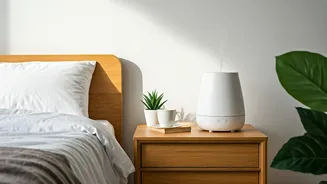Dietary Adjustments for Sleep
The food you consume plays a significant role in your sleep quality. Start by avoiding heavy meals and excessive caffeine, especially in the evening. Caffeine,
a stimulant, can keep you alert and prevent you from falling asleep. Also, reduce the consumption of alcohol before bedtime as it disrupts the sleep cycle. Try incorporating foods rich in tryptophan, such as turkey or nuts, which can promote sleep. Moreover, regulate your eating times, aiming to finish your dinner a few hours before bedtime. This allows your body to digest food properly, which leads to better sleep. Maintaining a balanced diet with proper nutrient intake is an essential strategy for achieving restful sleep. These dietary changes can help mitigate sleep apnea symptoms.
Exercise and Sleep Routine
Regular exercise is a powerful tool for improving sleep, but the timing matters. Aim for at least 30 minutes of moderate-intensity exercise most days of the week. This will help regulate your sleep cycle. While exercise benefits sleep, avoid intense workouts close to bedtime. Exercising too close to your bedtime can elevate your heart rate and make it harder to fall asleep. Consider engaging in relaxing activities like yoga or stretching, as they can relax the body and mind before sleep. Creating a consistent sleep schedule is also important. Go to bed and wake up at the same time every day, including weekends, to regulate your body's internal clock. This routine will aid in preventing sleep apnea.
Optimize Your Bedroom
Your bedroom environment can significantly affect your sleep quality. Make sure your bedroom is dark, quiet, and cool. Use blackout curtains or an eye mask to block out light, which can interfere with sleep. Consider using earplugs or a white noise machine to mask disruptive sounds. A cool room, usually around 60-67 degrees Fahrenheit, is ideal for sleep, as it helps regulate body temperature. Ensure your mattress and pillows are comfortable and supportive. Replace them every 7-10 years. Remove distractions such as smartphones or laptops. The bedroom should be a sanctuary for sleep. Also, consider an air purifier to reduce allergens that can impact sleep. This helps to make your sleep apnea better.
Mindfulness and Relaxation
Stress and anxiety can severely impact your sleep. Practice mindfulness techniques, such as meditation and deep breathing exercises, to calm your mind before bed. These techniques can help lower stress levels and improve relaxation. Establish a relaxing bedtime routine. Take a warm bath, read a book, or listen to calming music to wind down. Avoid screen time (phones, tablets, and computers) for at least an hour before bed, as the blue light emitted from these devices can interfere with your sleep. Consider using sleep tracking apps to monitor your sleep patterns and identify areas for improvement. These strategies are all helpful for sleep apnea.
Hydration and Sleep
Maintain proper hydration throughout the day, but be mindful of your fluid intake before bed. Drinking too many fluids before bedtime can lead to frequent trips to the bathroom during the night, disrupting your sleep. Aim to drink most of your fluids earlier in the day and reduce your intake in the evening. While staying hydrated is important, balance it with sleep quality. Try to avoid sugary drinks and caffeinated beverages, as they can impact your sleep. This approach ensures you benefit from hydration without disrupting your sleep. Monitoring your fluid intake can help with sleep apnea.
Manage Underlying Conditions
Certain medical conditions, such as depression, anxiety, and chronic pain, can contribute to sleep problems. If you suspect an underlying condition affects your sleep, consult a healthcare professional. They can diagnose and recommend appropriate treatments. Managing these conditions can significantly improve your sleep quality. This might involve medication, therapy, or lifestyle changes. Address any respiratory issues, such as nasal congestion or allergies, that may affect your breathing during sleep. Effective management of any existing health problems is a vital step in improving sleep apnea symptoms.
Seek Professional Help
If you are consistently struggling with sleep or suspect you have sleep apnea, seek professional help. Consult a doctor or a sleep specialist. They can perform tests, such as a sleep study, to determine the cause of your sleep problems and provide personalized treatment options. They might recommend continuous positive airway pressure (CPAP) therapy or other interventions. Do not hesitate to seek help if lifestyle changes are not enough. Early intervention and proper treatment can prevent the long-term health consequences of sleep apnea. A healthcare professional can guide you to find the right solutions for achieving restful sleep.















